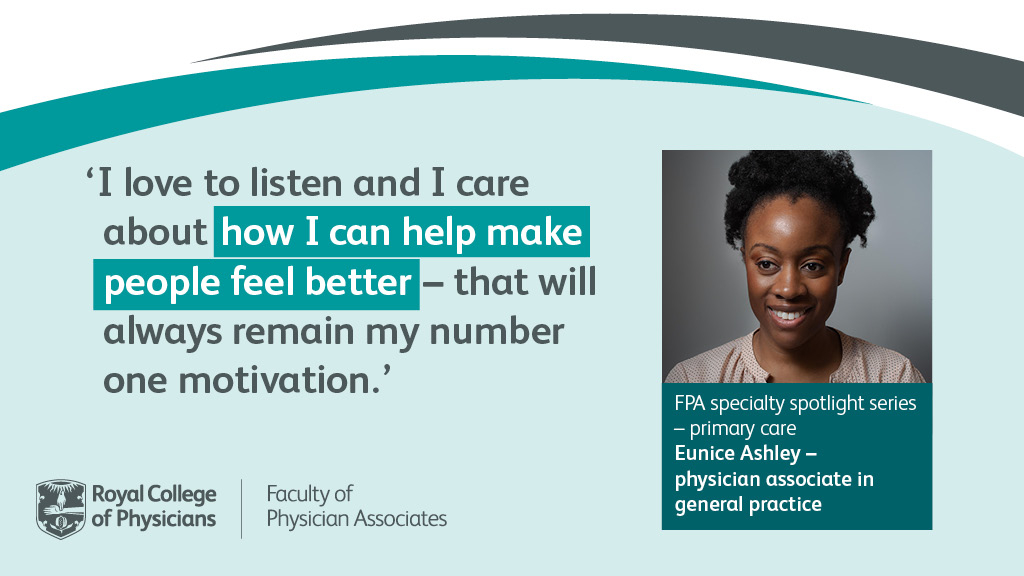Spotlight series – physician associates in primary care | Eunice Ashley
Each year, physician associates (PAs) continue to positively impact primary care, and the number of qualified PAs entering the area increases. Primary care involves a range of common medical conditions, so the generalist PA role is a perfect fit.
Eunice Ashley was within one of the first cohorts to qualify as a PA from St George’s University of London in 2010. Having worked in primary care for over 8 years, and as clinical lead for the primary care workforce for South West London Clinical Commissioning Group (CCG), Eunice shares her story.
What made you decide to become a PA?
My parents ran a residential care home for older people. From a young age, I spent weekends getting to know and learning to care for the residents which inspired my interest in healthcare. Between the ages of 8 and 15, I volunteered with the British Red Cross, and I always had a passion for the sciences at school. I had considered a career as either a doctor or in nursing/midwifery but couldn’t quite decide.
While working as a receptionist in a doctor’s surgery, I found an advert to become a PA in Birmingham. At the time, it was showcasing physician assistants – as the role was previously known and adopted from the USA. I saw that St George’s were due to begin running their first PA course, which was more local to me. I read about the role in America, as it was well-established there, and it felt like the correct route for me.
Can you tell us more about your experience of working as a PA in primary care?
 It was during my PA course that I developed a love for primary care, and the breadth of knowledge you learn, which was important to me. Upon graduation, I worked in vascular surgery for 2 years and began to specialise in cases of peripheral vascular disease and venous disease. While it was interesting, I still wanted to maintain a breadth of knowledge. It was then I saw an advert for a PA role in my current practice, and I have remained here since 2013.
It was during my PA course that I developed a love for primary care, and the breadth of knowledge you learn, which was important to me. Upon graduation, I worked in vascular surgery for 2 years and began to specialise in cases of peripheral vascular disease and venous disease. While it was interesting, I still wanted to maintain a breadth of knowledge. It was then I saw an advert for a PA role in my current practice, and I have remained here since 2013.
Every day is a new challenge in primary care as you never know what is going to come through the door, and I enjoy that uncertainty. Every individual patient is completely different, and it allows you to look at people holistically. We treat the younger generation through to older patients, meaning I get to explore a wide range of conditions and build up in-depth knowledge of them. This is the same when building relationships with patients too, and I enjoy the level of consistency I provide in primary care.
What diagnostic/investigation/procedural skills have you gained?
The primary care toolkit is very different from secondary care. We’re not only looking at the physical health of a patient, but their psychological health too, which I find interesting. A patient’s mental health can be impacted in multiple ways and I enjoy exploring and supporting those elements. It is also a great opportunity to consolidate knowledge and continually build on the complexity over time, and of varying conditions. This includes the interpretation of blood results, and my skill in this area has certainly developed vastly.
You know when your knowledge has grown when colleagues come to you for advice on patient cases. I focused a lot of time and effort on respiratory conditions and asthma, and I’m the respiratory lead in my practice. My skills continue to grow in a non-clinical environment too, and I believe I was the first UK PA to undertake the Darzi Fellowship. I was seconded to my local CCG, and I’m also the first PA primary care network joint clinical director.

How would you describe the impact your role as a PA has had in primary care?
I’m the only PA at my practice, and I’m proud that I have been able to have a positive impact in increasing capacity. I work extended hours, and we’re able to offer patients flexibility and spread the caseload across our GPs a result. I also offer increased appointment times, and patients take comfort in having the extra time with a healthcare professional.
My role as the respiratory lead involves ensuring all protocols and guidelines are maintained, and I manage educational sessions for our teams. I also have a strong interest in the workforce and how maintaining a happy, healthy workforce enables a positive patient experience. This includes providing a safe environment where service users can be honest and discuss their health concerns openly. In turn, it allows us to ensure we are making the correct interventions at the right time.
What do you find the most enjoyable and rewarding being a PA?
What drew me to healthcare initially was the people. I love to listen and I care about how I can help make people feel better – that will always remain my number one motivation. I enjoy the consistency of primary care and being able to build long-lasting relationships with my patients is important to me.
Another reason I was drawn to science and healthcare was the opportunity for lifelong learning and the ability to always strive to do better. I thrive when growing my knowledge, and it also benefits my patients, which will always drive me forward.
As a PA working in primary care, what challenges do you face?
When I qualified, there were very few PAs practising, and I was faced with the same questions – who was I, and what was I there to do. I constantly had to explain how I was contributing to their care. I quickly formed a standard response, which helped, and it’s fantastic to see the number of PAs still growing, and the foundations that have been set are helping to pave the way for them, which is comforting.
Like all PAs, I am hopeful that regulation and prescribing won’t be far away. It has become easier for us in primary care as during the COVID-19 pandemic we introduced electronic prescribing. This helps massively as I’m able to send an electronic message to a GP, so it has removed the need for me to physically wait outside their door for approval which has ultimately saved time.
What does the future look like for you as a PA?

I’ve remained open-minded about my career until this point, and I’m so grateful for the progression opportunities I’ve had come my way. I’m lucky that I currently have a great mix of clinical and non-clinical work, and I see myself remaining in primary care to explore this further. Continuing to grow my knowledge of new conditions excites me, along with the other challenges still to come.
What advice would you give to a PA looking to practise in primary care?
While the PA profession has come a long way, we are still in our infancy, and being patient is key. Not all patients or colleagues you encounter are going to understand first-hand who you are, but part of the challenge is navigating this.
Don’t be afraid to understand and follow your specific interests – even if nobody else has explored them before. If you’re the first to delve into a new opportunity, you should be excited and embrace the challenge. I would also say look for hidden opportunities, as sometimes the less obvious places offer up the most exciting ones.
We’re always looking for qualified PA FPA members to share their story. If you’re interested in sharing yours, get in touch using the contact details below. If you’re thinking of a career as a PA, you can learn more about how to begin your journey here.
Get in touch to share your PA story:
Jenna Donaldson – FPA communications officer
[email protected]
